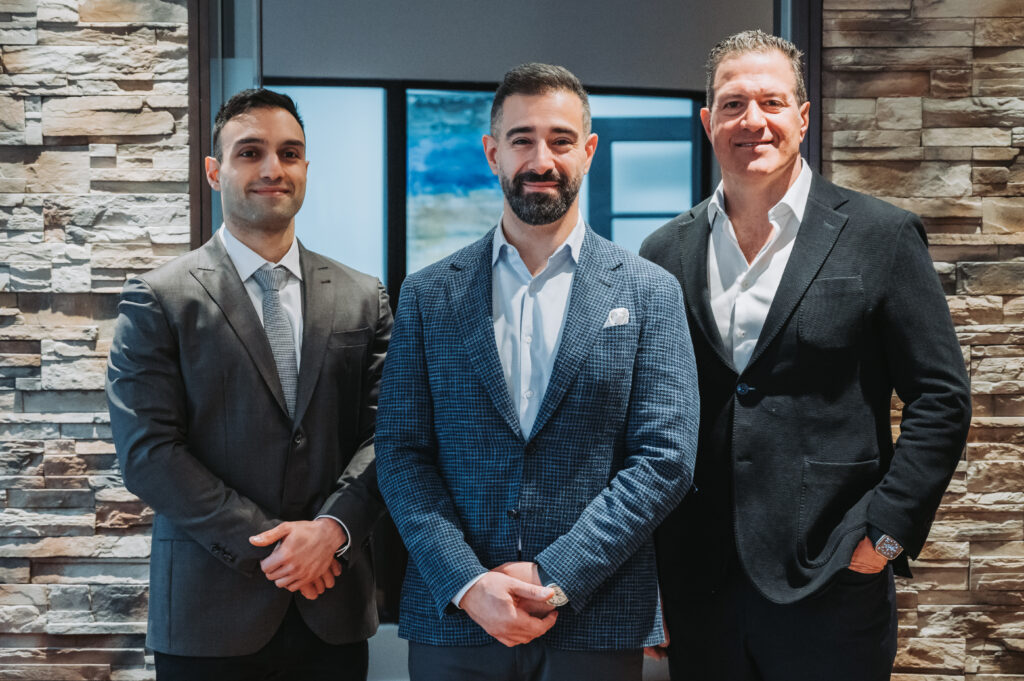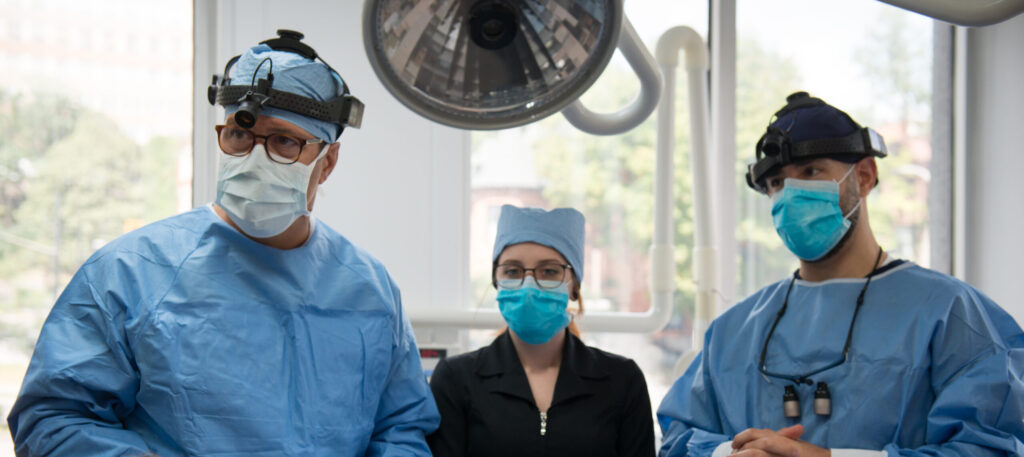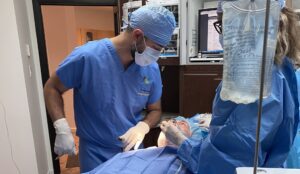Understanding Wisdom Teeth
Wisdom teeth, also known as third molars, are the last set of adult teeth to develop. They usually emerge between the ages of 17 and 25, a time when the rest of the permanent teeth have already settled into place. Located at the very back of the mouth, both in the upper and lower jaws, wisdom teeth can sometimes emerge without causing problems. However, for many individuals, these latecomers create oral health complications due to insufficient space in the jaw.
Most people have four wisdom teeth, but it’s not unusual to have fewer—or even none at all. Occasionally, individuals may develop extra (supernumerary) wisdom teeth. The number, position (including whether they are in the upper or lower jaw and in the back corners), and angle of these teeth all influence whether removal is necessary and how complex the procedure will be.
When wisdom teeth do not have enough room to grow properly, they can become impacted. This means they are trapped under the gum tissue or bone, or they may emerge at awkward angles that interfere with neighbouring teeth. Impacted wisdom teeth often lead to discomfort, swelling, and in some cases, serious dental complications such as:
- Persistent or sharp pain in the jaw
- Swelling and redness in the gums
- Development of cysts or fluid-filled sacs
- Tooth decay due to difficulty cleaning the area
- Pressure against adjacent teeth leading to alignment issues
These issues are why dentists and oral surgeons frequently recommend wisdom teeth surgery in Montreal. Even in the absence of symptoms, proactive removal can prevent future complications, supporting long-term oral health.
Why Wisdom Teeth Are Removed
The removal of wisdom teeth is not just about addressing current pain or infection; it’s also a preventive strategy. Dentists often recommend removing these molars before they fully emerge, particularly when imaging shows that they are likely to cause problems. Common reasons for extraction include:
- Partial eruption, which can create pockets for bacteria
- Impacted growth leading to infection or crowding
- Difficult-to-reach placement that increases the risk of decay
- Orthodontic treatment plans requiring more space in the jaw
In some cases, patients with compromised immune systems or pre-existing dental conditions may be more susceptible to infections or complications arising from wisdom teeth. For these individuals, removal becomes an essential preventive measure that reduces the likelihood of long-term oral health problems.
Wisdom teeth removal is one of the most common oral surgeries performed in Canada. It’s considered a safe, routine procedure with a high success rate, especially when performed by experienced specialists.
Risks of Delaying Wisdom Teeth Removal
Many people wonder if they can postpone or entirely avoid wisdom teeth extraction. While not everyone requires removal, delaying surgery when it is indicated can lead to serious complications:
- Infection Risk: Partially erupted teeth often trap food and bacteria, increasing the likelihood of painful infections like pericoronitis.
- Cyst Formation: Impacted teeth may be surrounded by fluid-filled sacs that can develop into cysts or even benign tumours, leading to jawbone damage.
- Damage to Adjacent Teeth: Pressure from emerging wisdom teeth can harm neighbouring molars, potentially leading to root resorption or decay.
- Nerve Involvement: As wisdom teeth develop, their roots grow longer and may come into close contact with nerves, making future removal riskier.
- Complicated Recovery: Younger patients tend to heal faster and more completely. Waiting until later in life increases the risk of complications and prolongs recovery.
Addressing problematic wisdom teeth early helps preserve your overall oral health and prevents more invasive procedures later.
Why Choose Seaforth Oral Surgery for Wisdom Teeth Surgery in Montreal
Choosing the right clinic for wisdom teeth surgery in Montreal can significantly affect the outcome and overall experience. At Seaforth Oral Surgery, our practice is built on years of expertise and a deep commitment to patient comfort. Our board-certified oral and maxillofacial surgeons—Dr. Marc Shenouda, Dr. Antoine Chehade, and Dr. Sina Hashemi—have handled thousands of wisdom tooth extractions, including complex cases involving deeply impacted or misaligned teeth.
What Sets Us Apart:
- Specialized Expertise: Our surgeons are experts in diagnosing and surgically removing wisdom teeth using advanced techniques and equipment.
- Comfort-Focused Care: We offer a variety of sedation options, customized recovery plans, and a calming clinical environment to ensure a stress-free experience.
- Multilingual Team: We provide care in both English and French, so you can communicate your needs clearly and confidently.
- Central Montreal Location: Our clinic is located conveniently in the heart of Montreal, easily accessible by public transit and car.
- Patient-Centered Philosophy: We believe in educating patients, answering all questions, and providing support before, during, and after surgery.
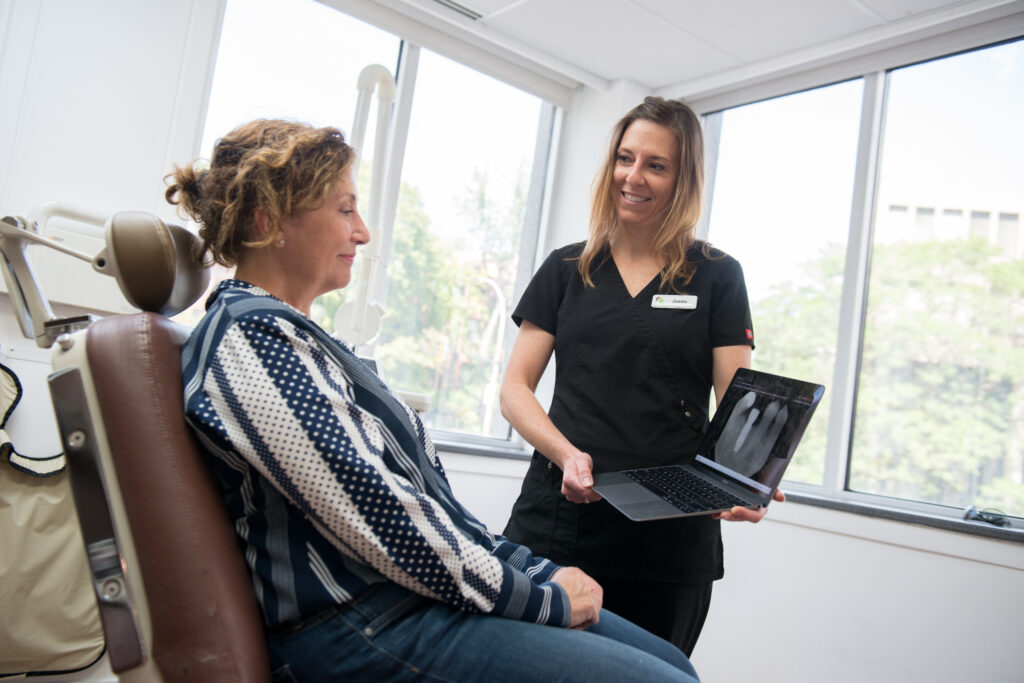
What to Expect: Preparing for Wisdom Teeth Removal
Preparation begins with a comprehensive consultation. During this visit, your oral surgeon will examine your mouth and take diagnostic images, such as panoramic X-rays or 3D cone-beam CT scans, to assess the position and condition of your wisdom teeth.
You’ll also discuss your anesthesia options, which may include:
- Local anesthesia: Numbs the immediate area; you’re awake but won’t feel pain.
- IV sedation: Administered through a vein to keep you relaxed and semi-conscious.
- General anesthesia: You’re fully asleep and monitored throughout the procedure.
Your pre-surgery instructions may include:
- Fasting for a specific period before surgery
- Discontinuing certain medications
- Arranging a ride home if sedation is used
In some cases, patients may be advised to adjust their schedule to accommodate recovery time or pre-emptively fill prescriptions. Preparing your home with soft foods and ice packs in advance can make the post-operative period more comfortable.
Following these guidelines carefully reduces the risk of complications and sets the stage for smooth recovery.
Types of Wisdom Teeth Problems Requiring Surgery
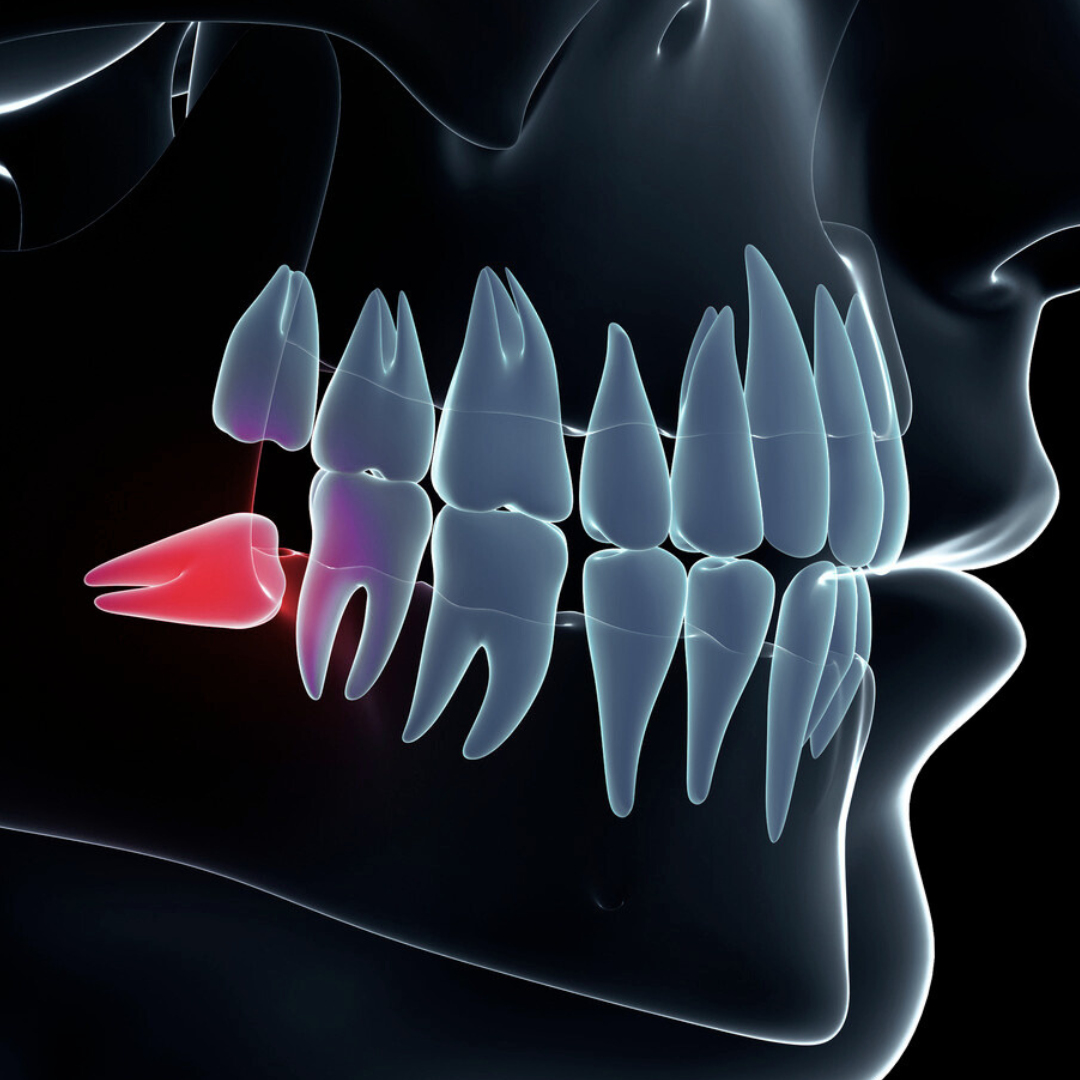 Impacted Wisdom Teeth
Impacted Wisdom Teeth
These are teeth that remain embedded in the jawbone or beneath the gum line due to a lack of space. They may grow at an angle toward the adjacent tooth (mesial impaction), away from it (distal impaction), or be completely horizontal. Impacted teeth can lead to swelling, infection, damage to neighbouring teeth, and jaw stiffness. In severe cases, they can even impact the alignment of your bite and contribute to crowding.
Partially Erupted Teeth
These wisdom teeth break through the gum only partially, leaving a flap of gum tissue that creates a breeding ground for bacteria. This can result in pericoronitis, an inflammation of the surrounding gum tissue, often accompanied by pain, bad breath, and difficulty chewing. Food and plaque easily get trapped in these areas, increasing the likelihood of tooth decay and gum disease.
Malpositioned or Misaligned Teeth
Wisdom teeth that erupt in incorrect positions—such as tilted, twisted, or rotated—can exert pressure on neighbouring teeth and cause alignment issues. They may also interfere with your bite, contributing to discomfort and jaw tension. These teeth are often more difficult to clean, increasing the risk of cavities and gum disease.
Cysts and Tumours
Occasionally, an impacted wisdom tooth may be associated with cysts or benign tumours. These fluid-filled sacs can cause significant damage to the jawbone, nerves, and nearby teeth if left untreated. Surgical removal of the wisdom tooth and cyst is essential to prevent bone loss and preserve oral function.
Preventive Extraction
Even wisdom teeth that aren’t currently causing problems may be removed as a preventive measure. If X-rays show that they are likely to become impacted or cause structural issues later on, early removal may help you avoid more complex procedures in the future. Younger patients also tend to recover faster and experience fewer complications, making early removal a strategic choice.
Note: While wisdom teeth have long been associated with dental crowding, recent studies suggest that they may not exert enough force to shift the position of neighbouring teeth significantly. Overcrowding is more often influenced by genetics, tooth size, jaw growth, and other factors. However, each case is unique, and a comprehensive evaluation by an oral surgeon is the best way to determine the appropriate treatment.
Identifying the type and severity of your wisdom teeth problem requires a detailed clinical evaluation and diagnostic imaging. At Seaforth Oral Surgery, we tailor treatment plans to each patient’s unique situation, ensuring the safest and most effective outcome.
Oral and Maxillofacial Surgery: Expertise for Complex Cases
Wisdom teeth surgery in Montreal becomes more intricate when the teeth are embedded in bone, situated near nerves, or causing broader dental concerns. That’s where oral and maxillofacial surgery comes in. Our specialists are trained in advanced surgical techniques that go beyond standard dental procedures. We manage everything from nerve proximity to jawbone repair with precision and care.
At Seaforth Oral Surgery, we use digital imaging, minimally invasive tools, and a comprehensive patient care approach to deliver excellent outcomes. We also collaborate with orthodontists, prosthodontists, and general dentists to ensure your treatment plan fits into your overall oral health strategy.
Patients with complex medical histories, such as those with bleeding disorders or autoimmune conditions, can particularly benefit from treatment under the care of a maxillofacial surgeon. Our team is equipped to coordinate care with your general physician or specialist to ensure a safe surgical experience.
The Surgical Process: What Happens During Wisdom Teeth Removal
A typical surgical extraction lasts between 30 and 45 minutes. After administering the chosen anesthesia, the oral surgeon will make a small incision in the gum tissue to expose the tooth. If the tooth is impacted or its roots are curved, it may be sectioned into smaller pieces for safe removal.
Once the tooth is removed, the area is cleaned, and stitches may be placed to aid healing. Some stitches dissolve on their own, while others may need to be removed at a follow-up appointment. Patients may receive a gauze pack to help form a blood clot, which is essential for proper healing.
Post-Op Instructions and Recovery Timeline
Recovery from wisdom teeth surgery in Montreal generally takes one to two weeks, with most of the discomfort subsiding in the first few days. Here’s what to expect:
- Pain and Swelling: Apply ice packs during the first 48 hours.
- Bleeding: Gauze pads should be used for the first hour or two post-op.
- Diet: Stick to soft, cool foods such as smoothies, mashed potatoes, yogurt, and broth. Avoid spicy foods and anything hard or crunchy.
- Oral Hygiene: Rinse gently with salt water after the first day. Avoid brushing the extraction site directly.
- Activity Restrictions: Rest for at least 48 hours, and avoid strenuous exercise for up to a week.
You may also be advised to elevate your head while sleeping and avoid sleeping on the side of the extraction to minimize swelling. Staying well-hydrated and avoiding hot foods or beverages in the first 24 hours can also speed up healing.
Managing Pain and Discomfort
Pain management is an important part of the healing process. Your surgeon will recommend appropriate medications based on your medical history and pain tolerance. You may also be advised to:
- Use acetaminophen or ibuprofen for mild to moderate pain
- Apply cold compresses to reduce swelling
- Perform gentle jaw exercises after a few days to improve range of motion
- Refrain from smoking, which can delay healing and increase the risk of dry socket
Some patients experience mild bruising along the jaw or neck, which is normal and resolves within a few days. If discomfort increases after three or four days, or if you experience fever, prolonged bleeding, or a foul taste in your mouth, contact your oral surgeon immediately.
When to Resume Normal Activities
Most patients return to work, school, or daily activities within 3 to 5 days. However, complete healing may take up to two weeks. You should avoid alcohol, smoking, and vigorous physical activity during this time. If you had general anesthesia, do not drive or operate machinery for at least 24 hours.
Follow-up appointments are an essential part of your recovery. Your surgeon will check the healing process, remove any non-dissolvable stitches, and answer any questions about resuming full activities, including exercise or travel.
Take the Next Step Toward Better Oral Health
Wisdom teeth surgery in Montreal doesn’t have to be daunting. Whether you’re experiencing pain or simply want a proactive evaluation, Seaforth Oral Surgery offers expert care in a supportive environment. Early assessment can help avoid complications and simplify treatment.
Book your consultation today with our skilled oral surgeons and take control of your oral health.
Understanding Wisdom Teeth
Wisdom teeth, also known as third molars, are the last set of adult teeth to develop. They usually emerge between the ages of 17 and 25, a time when the rest of the permanent teeth have already settled into place. Located at the very back of the mouth, both in the upper and lower jaws, wisdom teeth can sometimes emerge without causing problems. However, for many individuals, these latecomers create oral health complications due to insufficient space in the jaw.
Most people have four wisdom teeth, but it’s not unusual to have fewer—or even none at all. Occasionally, individuals may develop extra (supernumerary) wisdom teeth. The number, position (including whether they are in the upper or lower jaw and in the back corners), and angle of these teeth all influence whether removal is necessary and how complex the procedure will be.
When wisdom teeth do not have enough room to grow properly, they can become impacted. This means they are trapped under the gum tissue or bone, or they may emerge at awkward angles that interfere with neighbouring teeth. Impacted wisdom teeth often lead to discomfort, swelling, and in some cases, serious dental complications such as:
- Persistent or sharp pain in the jaw
- Swelling and redness in the gums
- Development of cysts or fluid-filled sacs
- Tooth decay due to difficulty cleaning the area
- Pressure against adjacent teeth leading to alignment issues
These issues are why dentists and oral surgeons frequently recommend wisdom teeth surgery in Montreal. Even in the absence of symptoms, proactive removal can prevent future complications, supporting long-term oral health.
Why Wisdom Teeth Are Removed
The removal of wisdom teeth is not just about addressing current pain or infection; it’s also a preventive strategy. Dentists often recommend removing these molars before they fully emerge, particularly when imaging shows that they are likely to cause problems. Common reasons for extraction include:
- Partial eruption, which can create pockets for bacteria
- Impacted growth leading to infection or crowding
- Difficult-to-reach placement that increases the risk of decay
- Orthodontic treatment plans requiring more space in the jaw
In some cases, patients with compromised immune systems or pre-existing dental conditions may be more susceptible to infections or complications arising from wisdom teeth. For these individuals, removal becomes an essential preventive measure that reduces the likelihood of long-term oral health problems.
Wisdom teeth removal is one of the most common oral surgeries performed in Canada. It’s considered a safe, routine procedure with a high success rate, especially when performed by experienced specialists.
Risks of Delaying Wisdom Teeth Removal
Many people wonder if they can postpone or entirely avoid wisdom teeth extraction. While not everyone requires removal, delaying surgery when it is indicated can lead to serious complications:
- Infection Risk: Partially erupted teeth often trap food and bacteria, increasing the likelihood of painful infections like pericoronitis.
- Cyst Formation: Impacted teeth may be surrounded by fluid-filled sacs that can develop into cysts or even benign tumours, leading to jawbone damage.
- Damage to Adjacent Teeth: Pressure from emerging wisdom teeth can harm neighbouring molars, potentially leading to root resorption or decay.
- Nerve Involvement: As wisdom teeth develop, their roots grow longer and may come into close contact with nerves, making future removal riskier.
- Complicated Recovery: Younger patients tend to heal faster and more completely. Waiting until later in life increases the risk of complications and prolongs recovery.
Addressing problematic wisdom teeth early helps preserve your overall oral health and prevents more invasive procedures later.
Why Choose Seaforth Oral Surgery for Wisdom Teeth Surgery in Montreal
Choosing the right clinic for wisdom teeth surgery in Montreal can significantly affect the outcome and overall experience. At Seaforth Oral Surgery, our practice is built on years of expertise and a deep commitment to patient comfort. Our board-certified oral and maxillofacial surgeons—Dr. Marc Shenouda, Dr. Antoine Chehade, and Dr. Sina Hashemi—have handled thousands of wisdom tooth extractions, including complex cases involving deeply impacted or misaligned teeth.
What Sets Us Apart:
- Specialized Expertise: Our surgeons are experts in diagnosing and surgically removing wisdom teeth using advanced techniques and equipment.
- Comfort-Focused Care: We offer a variety of sedation options, customized recovery plans, and a calming clinical environment to ensure a stress-free experience.
- Multilingual Team: We provide care in both English and French, so you can communicate your needs clearly and confidently.
- Central Montreal Location: Our clinic is located conveniently in the heart of Montreal, easily accessible by public transit and car.
- Patient-Centered Philosophy: We believe in educating patients, answering all questions, and providing support before, during, and after surgery.

What to Expect: Preparing for Wisdom Teeth Removal
Preparation begins with a comprehensive consultation. During this visit, your oral surgeon will examine your mouth and take diagnostic images, such as panoramic X-rays or 3D cone-beam CT scans, to assess the position and condition of your wisdom teeth.
You’ll also discuss your anesthesia options, which may include:
- Local anesthesia: Numbs the immediate area; you’re awake but won’t feel pain.
- IV sedation: Administered through a vein to keep you relaxed and semi-conscious.
- General anesthesia: You’re fully asleep and monitored throughout the procedure.
Your pre-surgery instructions may include:
- Fasting for a specific period before surgery
- Discontinuing certain medications
- Arranging a ride home if sedation is used
In some cases, patients may be advised to adjust their schedule to accommodate recovery time or pre-emptively fill prescriptions. Preparing your home with soft foods and ice packs in advance can make the post-operative period more comfortable.
Following these guidelines carefully reduces the risk of complications and sets the stage for smooth recovery.
Types of Wisdom Teeth Problems Requiring Surgery
 Impacted Wisdom Teeth
Impacted Wisdom Teeth
These are teeth that remain embedded in the jawbone or beneath the gum line due to a lack of space. They may grow at an angle toward the adjacent tooth (mesial impaction), away from it (distal impaction), or be completely horizontal. Impacted teeth can lead to swelling, infection, damage to neighbouring teeth, and jaw stiffness. In severe cases, they can even impact the alignment of your bite and contribute to crowding.
Partially Erupted Teeth
These wisdom teeth break through the gum only partially, leaving a flap of gum tissue that creates a breeding ground for bacteria. This can result in pericoronitis, an inflammation of the surrounding gum tissue, often accompanied by pain, bad breath, and difficulty chewing. Food and plaque easily get trapped in these areas, increasing the likelihood of tooth decay and gum disease.
Malpositioned or Misaligned Teeth
Wisdom teeth that erupt in incorrect positions—such as tilted, twisted, or rotated—can exert pressure on neighbouring teeth and cause alignment issues. They may also interfere with your bite, contributing to discomfort and jaw tension. These teeth are often more difficult to clean, increasing the risk of cavities and gum disease.
Cysts and Tumours
Occasionally, an impacted wisdom tooth may be associated with cysts or benign tumours. These fluid-filled sacs can cause significant damage to the jawbone, nerves, and nearby teeth if left untreated. Surgical removal of the wisdom tooth and cyst is essential to prevent bone loss and preserve oral function.
Preventive Extraction
Even wisdom teeth that aren’t currently causing problems may be removed as a preventive measure. If X-rays show that they are likely to become impacted or cause structural issues later on, early removal may help you avoid more complex procedures in the future. Younger patients also tend to recover faster and experience fewer complications, making early removal a strategic choice.
Note: While wisdom teeth have long been associated with dental crowding, recent studies suggest that they may not exert enough force to shift the position of neighbouring teeth significantly. Overcrowding is more often influenced by genetics, tooth size, jaw growth, and other factors. However, each case is unique, and a comprehensive evaluation by an oral surgeon is the best way to determine the appropriate treatment.
Identifying the type and severity of your wisdom teeth problem requires a detailed clinical evaluation and diagnostic imaging. At Seaforth Oral Surgery, we tailor treatment plans to each patient’s unique situation, ensuring the safest and most effective outcome.
Oral and Maxillofacial Surgery: Expertise for Complex Cases
Wisdom teeth surgery in Montreal becomes more intricate when the teeth are embedded in bone, situated near nerves, or causing broader dental concerns. That’s where oral and maxillofacial surgery comes in. Our specialists are trained in advanced surgical techniques that go beyond standard dental procedures. We manage everything from nerve proximity to jawbone repair with precision and care.
At Seaforth Oral Surgery, we use digital imaging, minimally invasive tools, and a comprehensive patient care approach to deliver excellent outcomes. We also collaborate with orthodontists, prosthodontists, and general dentists to ensure your treatment plan fits into your overall oral health strategy.
Patients with complex medical histories, such as those with bleeding disorders or autoimmune conditions, can particularly benefit from treatment under the care of a maxillofacial surgeon. Our team is equipped to coordinate care with your general physician or specialist to ensure a safe surgical experience.
The Surgical Process: What Happens During Wisdom Teeth Removal
A typical surgical extraction lasts between 30 and 45 minutes. After administering the chosen anesthesia, the oral surgeon will make a small incision in the gum tissue to expose the tooth. If the tooth is impacted or its roots are curved, it may be sectioned into smaller pieces for safe removal.
Once the tooth is removed, the area is cleaned, and stitches may be placed to aid healing. Some stitches dissolve on their own, while others may need to be removed at a follow-up appointment. Patients may receive a gauze pack to help form a blood clot, which is essential for proper healing.
Post-Op Instructions and Recovery Timeline
Recovery from wisdom teeth surgery in Montreal generally takes one to two weeks, with most of the discomfort subsiding in the first few days. Here’s what to expect:
- Pain and Swelling: Apply ice packs during the first 48 hours.
- Bleeding: Gauze pads should be used for the first hour or two post-op.
- Diet: Stick to soft, cool foods such as smoothies, mashed potatoes, yogurt, and broth. Avoid spicy foods and anything hard or crunchy.
- Oral Hygiene: Rinse gently with salt water after the first day. Avoid brushing the extraction site directly.
- Activity Restrictions: Rest for at least 48 hours, and avoid strenuous exercise for up to a week.
You may also be advised to elevate your head while sleeping and avoid sleeping on the side of the extraction to minimize swelling. Staying well-hydrated and avoiding hot foods or beverages in the first 24 hours can also speed up healing.
Managing Pain and Discomfort
Pain management is an important part of the healing process. Your surgeon will recommend appropriate medications based on your medical history and pain tolerance. You may also be advised to:
- Use acetaminophen or ibuprofen for mild to moderate pain
- Apply cold compresses to reduce swelling
- Perform gentle jaw exercises after a few days to improve range of motion
- Refrain from smoking, which can delay healing and increase the risk of dry socket
Some patients experience mild bruising along the jaw or neck, which is normal and resolves within a few days. If discomfort increases after three or four days, or if you experience fever, prolonged bleeding, or a foul taste in your mouth, contact your oral surgeon immediately.
When to Resume Normal Activities
Most patients return to work, school, or daily activities within 3 to 5 days. However, complete healing may take up to two weeks. You should avoid alcohol, smoking, and vigorous physical activity during this time. If you had general anesthesia, do not drive or operate machinery for at least 24 hours.
Follow-up appointments are an essential part of your recovery. Your surgeon will check the healing process, remove any non-dissolvable stitches, and answer any questions about resuming full activities, including exercise or travel.
Take the Next Step Toward Better Oral Health
Wisdom teeth surgery in Montreal doesn’t have to be daunting. Whether you’re experiencing pain or simply want a proactive evaluation, Seaforth Oral Surgery offers expert care in a supportive environment. Early assessment can help avoid complications and simplify treatment.
Book your consultation today with our skilled oral surgeons and take control of your oral health.


